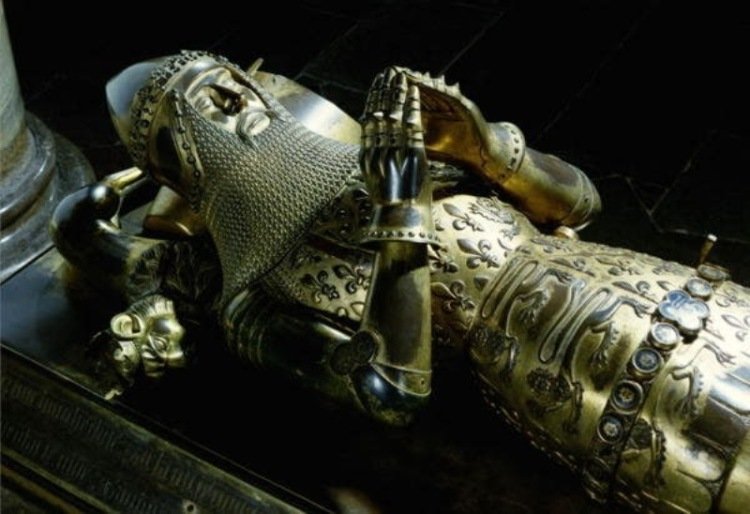Edward Of Woodstock “Black Prince” – Idol Of The English People And Terror Of The French
A. Sutherland - AncientPages.com - Edward of Woodstock (1330-1376) was the eldest son and heir of England's King Edward III Plantagenet.
Historically speaking, he was a very talented leader during the Hundred Years War (1337 to 1453), a series of battles with periods of peace in between, which were fought in France between England and France and later Burgundy.
This statue of Edward The Black Prince by Thomas Brock stands in the City Square In Leeds. Source: Flickr - Chalkstream
Edward (only 16 years old) commanded the English army during the famous Battle of Crecy in 1346.
After his birthplace, he was known as Edward of Woodstock. Interestingly, his nickname "Black Prince" is not mentioned in written historical records until the 16th century, almost two centuries after his death.
Undoubtedly, Edward the Black Prince showed early military genius; he was a talented warrior, motivated and hardened by many years of active presence in battles, which confirmed his excellent martial arts. He was known as a great commander and a thriving tournament participant during his lifetime. His excellent reputation as a chivalric hero also contributed to his fame.
His significant victory over the French at the Battle of Poitiers made him very popular during his lifetime. He captured John the Good, king of France, and Philip the Bold, his youngest son, and did his best to treat them with great respect. He even permitted King John to return home and reportedly prayed with John at Canterbury Cathedral.
The tomb of the Black Prince in the Catedral de Canterbury, 1376. Image credit: Josep Renalias - CC BY-SA 2.5
As R. J. White wrote in his "England: A History," the Black Prince "treated his defeated enemy with the ceremony due to his rank, seating him in his own chair, and serving him food with his own hands…."
Remarkably, this great knight also allowed a day for preparations before the Battle of Poitiers so that the two sides could discuss the coming battle.
Records confirm that contemporaries praised the Black Prince's chivalry, modesty, courage, and even courtesy on the battlefield. However, some claim "he may have been playing for time to complete preparation of his archers' positions."
"The Black Prince was not always a chivalry man, especially regarding his brutalities of war as conducted by him in southern France, where he and his marauding knights behave like freebooters…" (R.J. White)
His main goal was to weaken the unity and economy of France by using medieval warfare to undermine the enemy. He repeatedly ordered the burning, pillaging, and slaughtering of villages and conquered cities. It was against contemporary ideas of chivalry, but it was pretty effective in accomplishing the goals of his campaigns in France.
How did Edward "Black Prince" get this unusual nickname?
Edward The Black Prince receives the grant of Aquitaine from his father King Edward III" Initial letter "E" on a page of illuminated manuscript, date: 1390; British Library. Public Domain
No doubt, Edward was the most famous medieval warrior of his day. But he could be cruel and not always behave as a man of honor. One example can be the city of Limoges, which was stormed and sacked in 1370. Other historians suggested his nickname may have been derived from the French habit of referring to a ruthless commander as a "black boar."
It may originate from his habit when jousting; he used to put aside his royal coat of arms in favor of a "black shield for peace" decorated with three white ostrich feathers.
In her book "Life of Edward the Black Prince," Louise Creighton (1850 – 1936) wrote:
"The sack of Limoges shows us the dark side of chivalry. We must not blame the Black Prince too severely for it. In sacrificing the innocent inhabitants of a whole city for his revenge, he was only acting in accordance with the spirit of the age in which he lived… This was what chivalry led to, and all its bright features cannot make us forgive its disregard of human suffering. Doubtless, this terrible sack is a blot upon the Black Prince's character, but we could hardly have hoped to find him superior to his age…"
"…We must also remember, in his excuse, that he was at that time suffering from a severe and painful illness and suffering even more bitterly in mind at the loss of his proud position and the breakup of his dominions."
But while trying to see what may be said in his excuse, we should not shut our eyes to the seriousness of the crime. The killing of the innocent population could do no good and have no beneficial result.
"…What the Black Prince did was to sacrifice all the inhabitants of a prosperous city to his own thirst for revenge…."
Could these atrocities be in any way explained that he was at that time suffering from a severe and painful illness?"
In 1367, the Black Prince participated in the Spanish campaign, which was unsuccessful. Moreover, he was seriously ill, which forced him to return to England. His critical state of health prevented him from further political activity. He was the first English Prince of Wales who did not become King of England. He died on June 8, 1376, a week before his birthday and one year before his father. He was buried in glory in Canterbury Cathedral.
He was the father of King Richard II of England. He was the first Duke of Cornwall (from 1337), the Prince of Wales (from 1343), and the Prince of Aquitaine (1362–72).
Written by – A. Sutherland AncientPages.com Staff Writer
Updated on November 28, 2022
Copyright © AncientPages.com All rights reserved. This material may not be published, broadcast, rewritten or redistributed in whole or part without the express written permission of AncientPages.com
Expand for referencesReferences:
Barber, R.. Edward, Prince of Wales and Aquitaine
Creighton L. Life of Edward the Black Prince
White R. J. England: A History
More From Ancient Pages
-
 Sword-Kladenets – Hidden Treasure Awaiting A Worthy Hero
Featured Stories | Feb 15, 2021
Sword-Kladenets – Hidden Treasure Awaiting A Worthy Hero
Featured Stories | Feb 15, 2021 -
 Chaco Canyon Mystery Solved By Scientists Hauling Logs On Their Heads
Archaeology | Feb 23, 2023
Chaco Canyon Mystery Solved By Scientists Hauling Logs On Their Heads
Archaeology | Feb 23, 2023 -
 8200-Year-Old ‘Viste Individual’ – DNA Analysis May Shed Light On Early Migration To Norway
Archaeology | Dec 6, 2015
8200-Year-Old ‘Viste Individual’ – DNA Analysis May Shed Light On Early Migration To Norway
Archaeology | Dec 6, 2015 -
 First Pay Toilets Were Invented In Ancient Rome In 74 A.D.
Ancient History Facts | Jan 29, 2017
First Pay Toilets Were Invented In Ancient Rome In 74 A.D.
Ancient History Facts | Jan 29, 2017 -
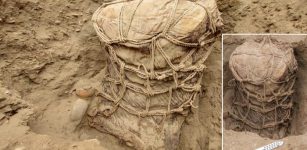 A 500-Year-Old Funerary Bundle And Pottery Probably Belonging To Ychsma Culture – Unearthed Near Lima, Peru
Archaeology | May 22, 2023
A 500-Year-Old Funerary Bundle And Pottery Probably Belonging To Ychsma Culture – Unearthed Near Lima, Peru
Archaeology | May 22, 2023 -
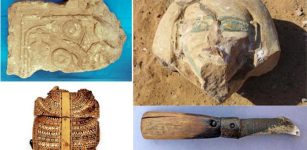 20 Mummies Discovered In Greco-Roman Tombs In Aswan, Egypt
Archaeology | Jan 21, 2022
20 Mummies Discovered In Greco-Roman Tombs In Aswan, Egypt
Archaeology | Jan 21, 2022 -
 On This Day In History: Count Leo Tolstoy Was Censored – On Feb 20, 1901
News | Feb 20, 2017
On This Day In History: Count Leo Tolstoy Was Censored – On Feb 20, 1901
News | Feb 20, 2017 -
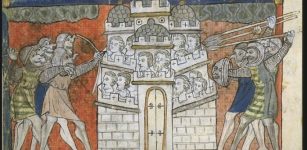 Gog And Magog Prophecy In The Book Of Revelation
Biblical Mysteries | Oct 11, 2018
Gog And Magog Prophecy In The Book Of Revelation
Biblical Mysteries | Oct 11, 2018 -
 Are The Ten Commandments Based On The Forty-Two Principles Of Maat That Appeared 2,000 Years Earlier?
Biblical Mysteries | Jul 15, 2017
Are The Ten Commandments Based On The Forty-Two Principles Of Maat That Appeared 2,000 Years Earlier?
Biblical Mysteries | Jul 15, 2017 -
 Pamola: Mighty Thunderbird In Myths Of Penobscot People Of Maine
Featured Stories | Apr 25, 2019
Pamola: Mighty Thunderbird In Myths Of Penobscot People Of Maine
Featured Stories | Apr 25, 2019 -
 Unique 8,000 Year-Old Child Burial Reveals Its Secrets
Archaeology | Nov 3, 2020
Unique 8,000 Year-Old Child Burial Reveals Its Secrets
Archaeology | Nov 3, 2020 -
 Vettuvan Koil Temple Spectacular Monolith Dedicated To Lord Shiva And Built By Pandya Dynasty
Featured Stories | May 25, 2021
Vettuvan Koil Temple Spectacular Monolith Dedicated To Lord Shiva And Built By Pandya Dynasty
Featured Stories | May 25, 2021 -
 Human Activities In The Year 1300 Impacted Earth’s Atmosphere More Than Previously Known
Archaeology | Oct 9, 2021
Human Activities In The Year 1300 Impacted Earth’s Atmosphere More Than Previously Known
Archaeology | Oct 9, 2021 -
 On This Day In History: Ceres Discovered By Giuseppe Piazzi – On Jan 1, 1801
News | Jan 1, 2017
On This Day In History: Ceres Discovered By Giuseppe Piazzi – On Jan 1, 1801
News | Jan 1, 2017 -
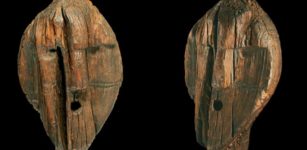 Does The Shigir Idol Depict Demons And Evil Spirits?
Archaeology | May 3, 2018
Does The Shigir Idol Depict Demons And Evil Spirits?
Archaeology | May 3, 2018 -
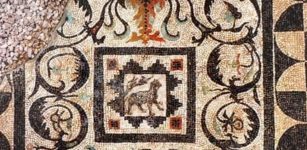 Beautiful Mosaic Dated To Graeco-Roman Times Discovered In Alexandria, Egypt
Archaeology | Jul 22, 2019
Beautiful Mosaic Dated To Graeco-Roman Times Discovered In Alexandria, Egypt
Archaeology | Jul 22, 2019 -
 The Colored Skeletons Of 9000-Year-Old Çatalhöyük (Catalhoyuk), Turkey – New Examination
Archaeology | Mar 18, 2022
The Colored Skeletons Of 9000-Year-Old Çatalhöyük (Catalhoyuk), Turkey – New Examination
Archaeology | Mar 18, 2022 -
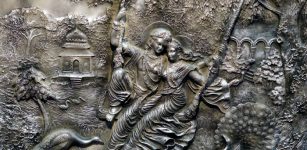 Mysterious Forest Of Treasure – Why Is It Forbidden To Stay In Nidhivan After Sunset?
Featured Stories | Nov 24, 2021
Mysterious Forest Of Treasure – Why Is It Forbidden To Stay In Nidhivan After Sunset?
Featured Stories | Nov 24, 2021 -
 DNA Study Sheds Light On The Mysterious Picts Of Scotland
DNA | Jul 7, 2023
DNA Study Sheds Light On The Mysterious Picts Of Scotland
DNA | Jul 7, 2023 -
 Ancient Feneos excavations: defensive walls, five towers, sanctuary unearthed
Civilizations | Aug 23, 2015
Ancient Feneos excavations: defensive walls, five towers, sanctuary unearthed
Civilizations | Aug 23, 2015


